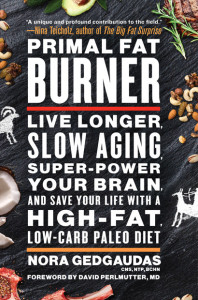 I will admit to feeling a bit like a little kid today. I just spent this last weekend at the Nutrition and Metabolism Society Symposium in Seattle, WA (as an extension of the Western Regional Obesity Conference put on by the American Society Of Bariatric Physicians) listening to and learning volumes from some of the top experts–physicians, writers, researchers and clinical experts– in the field of nutrition, medicine, diet and health, focused mainly on the low carbohydrate perspective. It was also an opportunity to forge personal relationships, network and pick the brains of some of the finest minds in the field over dinner and in a more socially relaxed environment.
I will admit to feeling a bit like a little kid today. I just spent this last weekend at the Nutrition and Metabolism Society Symposium in Seattle, WA (as an extension of the Western Regional Obesity Conference put on by the American Society Of Bariatric Physicians) listening to and learning volumes from some of the top experts–physicians, writers, researchers and clinical experts– in the field of nutrition, medicine, diet and health, focused mainly on the low carbohydrate perspective. It was also an opportunity to forge personal relationships, network and pick the brains of some of the finest minds in the field over dinner and in a more socially relaxed environment.
The names read like a Who’s Who of heavy hitters: Gary Taubes (talked about the well established but forgotten history of carbohydrate restricted diets), Jay Wortman, MD–a former guest on my radio show (talking about carbohydrate restriction in different populations), Stephen Phinney, MD, PhD–my new favorite genius biochemist (why saturated fats exist–aligning physiology with evolution), Richard Fineman, PhD (the logic behind carbohydrate restriction as the default diet), along with Jacqueline Eberstein, RN (who presented on practical applications of a low carbohydrate lifestyle), Mary Vernon, MD (the benefits of carbohydrate restriction on medical illness), Donald Layman, PhD (on the effects of protein thresholds on body composition), Diane Stadler, PhD, RD (the many positive hormone altering effects of low carbohydrate diets). There were also some legendary names in attendance such as Michael and Mary Dan Eades and (my long time hero) Ron Rosedale.
Blogger and radio show host Jimmy Moore of “Livin’ La Vida Low Carb”, along with his wife, Christine were also in attendance and a good time was had by all. There were also rich discussions about new physiological findings concerning fat metabolism, obesity, diabetes, sports performance and many many other fascinating topics from a pure science perspective that kept me riveted from sun-up to sundown.
Call me a total geek—this symposium was MY idea of a thrilling party. I’m on cloud 9…and maybe just a little giddy.
Rest assured, bit by bit the findings of this weekend (all absorbed in my head like a sponge) will be seeping into my blog posts and other places along the way for all to share. I’d have too hard a time keeping it all to myself.
~ Nora






Can’t wait to read what you’ve gleaned! Thanks for doing the research so we can all benefit.
Hi Nora,
I am looking forward to reading more about the conference. I just purchased Ron Rosendale book. I have not read it all but was dismayed that he seems to discourage the use of saturated fats in favor of monounsaturated fats like avocado, almond and olive oil. He does not like red meat or full fat dairy and encourages eating nuts but does not talk about soaking them first.
What do you think about Coconut flour and eating breads and muffins made with it? I have been reading Bruce Fife also. Do you have to be concerned about phytic acid in coconut? Have you read the new issue of Nourishing Traditions? There is an article about how to prepare seeds, nuts, legumes and grains to avoid consuming to much phytic acid. Wow – if you want to eat these foods you need to know how to prepare them.
Truthfully, Ron Rosedale comes closer than just about anyone to really “getting it” with respect to the dietary and endocrine forces that govern our health and aging. I had an opportunity recently to speak with Ron one on one at some length about a number of things and we discussed this very issue to which you express concern. Ron told me that his only issue with saturated fats lies in the slower rate at which they may be burned for energy in the initial stages of weight loss. Dr. Rosedale was not of the opinion, however that saturated fats were problematic in any other way. Dr. Stephen Phinney, author and a foremost expert lipid researcher recently presented at the Nutrition and Metabolism Society Symposium in Seattle, WA on the topic of (among other things) fat metabolism. Contradicting this notion, he clearly stated that saturated, monounsaturated and polyunsaturated fats are all beta-oxidized at essentially the same rate in humans.
Dr. Rosedale’s stance on red meat is what it is entirely because of his concern about the risk of getting excess dietary iron. He wasn’t overly emphatic about this point, either. Indeed, if an individual is maintaining the recommended RDA level of protein consumption per day the risk of any such thing would be virtually non-existent in all but those with hemochromatosis. In fact, I see many more problems in general with anemia–both clinical and subclinical–than anything with iron overload with even those eating conventionally. Excess and problematic dietary iron is much more likely to come from inorganic exogenous sources such as cast iron cookware, refined “fortified” flours, distilled alcohol consumption and drinking municipal water sources high in iron and/or delivered through cast iron pipes.
I think coconut flour is a wonderful alternative to most “gluten-free flours”, as it is certainly lower in carbohydrate content and contains some beneficial fats. I never eat anything like bread or muffins at all ever and prefer to eliminate foods like this altogether–but if someone HAD to have some, coconut would be the way to go. Adding a little coconut flour to your diet isn’t likely to generate significant phytic acid woes and I wouldn’t worry about it. Soaking and dehydrating your nuts is always a smart practice, however, particularly if you happen to enjoy eating nuts in any quantity. Once you get used to this practice it really isn’t that time consuming or a big deal at all.